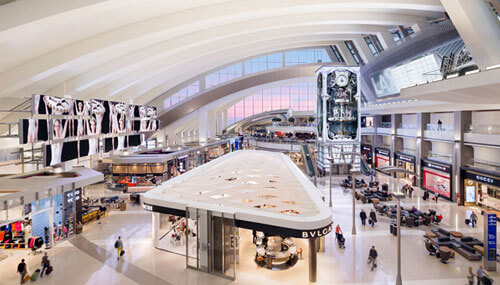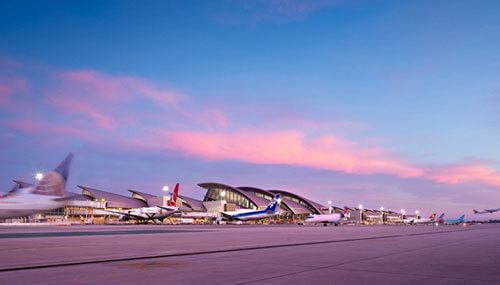Bull Session
Stephen Cheung: The Future of Trade with China

Stephen Cheung is president of the World Trade Center Los Angeles, which is responsible for attracting and managing foreign direct investment entering Los Angeles County. Cheung leads the development of international trade and business opportunities for Southern California companies, thereby driving the region’s economy, job growth and innovation. He also develops programs for international companies seeking to locate or expand in Los Angeles. Prior to this, Cheung served Los Angeles Mayor Eric Garcetti as the secretary general of foreign affairs and trade.
What are the most exciting, and biggest, emerging trends between the United States and China?
There are just so many interesting aspects between the U.S. and China. I would specifically say that the changing shipping industry is really going to transform Los Angeles altogether. In the last five years, new technology and megaships have come alive that we’ve never seen before.
For example, transpacific ships usually carry 6,000 to 9,000 TEUs (shipping containers). Imagine all these ships coming into Los Angeles with goods from China. It makes a big impact on the ports of Los Angeles and Long Beach, which are the No. 1 and No. 2 container ports in North America, because of our trade with China, which accounts for 60 percent. As the shipping industry changes, the ships are also changing and getting bigger. Before, the biggest ship was 6,000 TEUs, then it became 9,000, and the next wave was 13,000. The largest ship that ever called in North America was 19,000 TEUs — which stands taller than the Eiffel Tower! All the boxes that are inundating the ports are really impacting the way we do business here.
Another factor that’s going to change trade, but isn’t directly related to China yet, is the Trans-Pacific Partnership. If the TPP is passed by Congress, it will be the largest trade deal in world history. Twelve countries signing a trade pact together, representing 60 percent of the world’s GDP is huge — even if China isn’t included. This will really impact the way we conduct business with a lot of other nations and it’s a positioning move set by the U.S. to balance trading activity with China.
Speaking more specifically of the TPP, how exactly will it impact trade? How can businesses prepare?
Once the TPP comes into effect, we’ll see trade barriers and tariffs being removed, procedures and regulations being unified, along with increased U.S. exports. It’ll be much easier to trade with foreign countries, and it’ll help increase the ability for the U.S. to export. Because we have the No. 1 and No. 2 container ports and the No. 1 origin airport in the world, we really have the ability to take advantage of our existing infrastructure. We’re not just looking at trade changes; lawyers, accountants, banks, financiers and all service providers are also going to see a benefit. This is a huge market and not a lot of people understand the impact this is going to have. That’s why I’m pushing for folks to understand the TPP better and also teach it in the future.
Businesses need to start lining things up and getting service providers ready. They need to understand the implications. For example, we’re strong in certain areas, like drone and aerospace technology, since they’ve been developing in Los Angeles for many years. As these products get exported to Indonesia, New Zealand, Australia, etc., what implications, what changes are there and how do you balance that? You need to have a service provider that understands and can navigate this area to help you. If they don’t know about the various regulations that prevent the U.S. from trading technology, it really changes everything. Businesses need to start talking to service providers in TPP countries to get a better understanding.
Can you talk a little more on how foreign direct investment might be changing? What are the main developments you’re seeing that keep Los Angeles competitive?
Real estate transactions have traditionally been big because it’s been the easiest transaction and the simplest way Chinese investors could enter the market. But, as with the Japanese investments that came in the ‘70s and ‘80s, money has begun transitioning to other sectors and industries.
We’re now seeing this trend with China through investment in companies like Riot Games Inc. and Tencent Holdings Ltd., proving that the future of foreign direct investment is in technology mergers and acquisitions. Companies like Faraday Future and BYD Co. Ltd. are an example of more tech- and transportation-related businesses that are entering Los Angeles. Chinese investors are now the majority shareholders and are taking control of company operations. The important distinction is that they’re not here to take technology back to China; they’re competing in the U.S. marketplace and taking advantage of the distribution network they have established here.
Los Angeles is an international metropolis. We’re a global city and we need to act like it, and I think people have started realizing that when you don’t have international visitors, you don’t have international investors. If we want to continue receiving international investments and business, we can’t act like a small, third-tier town. We attribute our city’s success to diversity — we love diversity, and our goal is to increase global connectedness. To keep our city relevant and competitive, the Los Angeles County Economic Development Corporation is rolling out a five-year strategic plan for economic development and the World Trade Center will be a partner to help implement this plan. We’re making sure it’s easier for global companies to locate here, because Los Angeles is fantastic — and we all know it.
Do you see some new developments at the Los Angeles International Airport (LAX)?
LAX has been a huge player in the international trade market, and people don’t remember that a lot of their goods are flown in inside the bellies of passenger planes. Cargo planes come in as well. Your iPhones that are manufactured in China aren’t going to be shipped in a container box that’s going to go across the ocean and take a week to arrive; they’re going to be flown in along with some sensitive food products.

"LAX has always been a key connector between the Asian market and Los Angeles, and we see huge potential."
LAX has always been a key connector between the Asian market and Los Angeles, and we see huge potential. This explains why the government, from the city to the airport, has been investing quite a lot in the airport’s infrastructure. Tom Bradley International Terminal got over $4 billion in investments alone, but every single terminal around the entire LAX area — whether it’s United, American or Delta — is going through a transformation. Right now, Terminal 1, along with Terminals 2 and 3, will be completely updated. People are going to get state-of-the-art airport facilities, but you can’t have the facility be fantastic if you can’t connect it to the city, which is a major problem right now.
So, in addition to upgrading the terminals, LAX is working on a transportation solution. This will include a central area where you can drop and pick up passengers. These passengers will then board a people mover — which is a tram system that will take people to their gates. This will eliminate the horseshoe effect of consolidated traffic. You’ll also see a consolidated car rental area where cars will go in and out and people can hop on a system that allows rental car locations to be closer to the airport and less disconnected. Altogether, these improvements are a $10 billion commitment from the government. This commitment opens up opportunities for large foreign companies to further bid on these projects, and we’re going to see a lot more Chinese companies coming in.
"Los Angeles is an international metropolis. We’re a global city and we need to act like it."

Are there any new projects that are happening in terms of amusement parks?
Well, Los Angeles is the entertainment capital of the world. Not just in the United States, but of the world. Whether it’s the Academy Awards, the Grammys or the Golden Globes, it’s all here. We’re able to attract a lot of international tourists thanks to Hollywood, and, on top of that, our theme parks, like Universal Studios and Disneyland, are world-renowned. People know that this is the place to be. With new developments at our theme parks utilizing movie magic, like “Harry Potter” and “Star Wars,” it’s going to blow everything out of the water! Orlando, Florida, hasn’t been able to do much of that with their theme parks like we have, and there’s not much else you can do besides go to these theme parks.
Sign up for the Reach Further Newsletter
We’ll keep you in the know about the latest US-Asia business news and trends.
Suscríbase al boletín Reach Further
Lo mantendremos informado sobre las últimas noticias y tendencias comerciales entre Estados Unidos y China.

